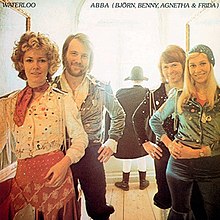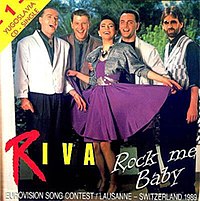10
EUROVISION
SONGS
THAT
CHANGED THE CONTEST FOREVER!
The
Eurovision Song Contest began in 1956. Hundreds of songs have been performed
over the decades since its debut. Here are the 10 that have had the greatest impact
on the contest, listed in chronological order.
1958
(Italy)
NEL
BLU DIPINTO DI BLU (VOLARE)-
DOMENICO
MODUGNO

Eurovision’s
early years was dominated by dreary throwbacks to the years prior to the advent
of rock ‘n roll. Most winners came and went, fading swiftly into obscurity. One
notable exception was “Nel Blu Dipinto Di Blu (Volare)”. The song may have only
finished in 3rd place at Eurovision, but it was an international
smash hit, even charting in countries unfamiliar with the contest. It reached
#1 in America and Australia; won Grammy Awards for Record and Song of the Year; and proved Eurovision could launch a major hit record.
1965
(Luxembourg)
POUPEE DE CIRE POUPEE DE SON-
FRANCE GALL


It took 9 years to occur, but finally a Eurovision winner reflected the pop sounds of the time. France Gall's victory with the Serge Gainsbourg composition "Poupee De Cire Poupee De Son" was a radical departure from the mostly forgettable previous winners. Eurovision had finally caught up with the Fabulous Sixties.
1967
(United Kingdom)
PUPPET ON A STRING-
SANDIE SHAW


The UK was the leading exponent of pop music in the 1960s. It was the birthplace of Beatlemania, Merseybeat and the British Invasion. The musical hub produced a contemporary hit in "Puppet On A String". It was performed by one of the biggest stars in Britain: Sandie Shaw. She was the first major pop act to represent a country at Eurovision. Many have since followed in her wake, including Cliff Richard, Mary Hopkin, Jedward and Blue. It proved that if a country sends a worthy act, it can lead to Eurovision glory. Sadly, the UK seems to have forgotten this lesson in recent decades.
1974
(Sweden)
WATERLOO-
ABBA


Eurovision’s greatest winning act ever remains Swedish pop titans ABBA. They transformed Eurovision with the classic pop sound of "Waterloo". It put Eurovision on the map. The group's sound and image has been imitated by other acts, including winners Brotherhood Of Man, Bucks Fizz and Charlotte Nilsson. After winning the ESC, ABBA invaded the music charts all over the world.
1987
(Ireland)
HOLD ME NOW-
JOHNNY LOGAN


When Johnny Logan won Eurovision in 1980 with "What's Another Year", few would have predicted Ireland's future ESC fortunes. He returned 7 years later, representing Ireland again. This time, Logan had penned the song. "Hold Me Now" gave the singer / songwriter a 2nd win. In 1992, he wrote another Irish winner- "Why Me", performed by Linda Martin. No other performer has come close to Logan's level of success at Eurovision. He has contributed to 3 of Ireland's record 7 wins as either performer / composer.
1989
(Yugoslavia)
ROCK ME-
RIVA


The changes in Europe have been a feature of Eurovision. Countries such as Germany have re-united. The old Soviet Union has splintered into various new nations, as have Czechoslovakia and Yugoslavia. The latter won Eurovision in 1989. This achievement marked a turning point, ending the domination of Western Europe at the top of the ESC leaderboard. The win brought Eurovision to the Balkans.
1998
(Israel)
DIVA-
DANA INTERNATIONAL


Dana International's selection to represent Israel at Eurovision in 1998 sparked controversy and security concerns. The transgender performer even received death threats. Despite all the issues, Dana International snatched victory. Eurovision was breaking down barriers. This win paved the way for Conchita Wurst and other GLBTI acts.
2004 (Ukraine)
WILD DANCES-
RUSLANA


Eurovision had already been held in Eastern Europe by the time Ruslana stormed to victory in 1998. Estonia had already won in 2001. Latvia followed the next year. Turkey claimed victory in 2003. After the crumbling of the Soviet Union, new nations emerged. The Ukraine's ESC debut was in 2003. A year later, "Wild Dances" took home the trophy. Former Soviet bloc territories have since dominated the upper rungs of the leaderboard.
2010 (Germany)
SATELLITE-
LENA


Eurovision was given a re-boot in 2010. Lena's "Satellite" targeted a younger audience and attracted votes from a demographic that had lost interest in the ESC. Her win also proved that one of the 'Big 5' countries (Germany, Italy, France, Spain & United Kingdom do not need to qualify in a semi-final and are therefore automatically slated for the Grand Final) could still win the contest. Until "Satellite" one of the 5 nations had not won since 1997.
2015 (Australia)
TONIGHT AGAIN-
GUY SEBASTIAN


Eurovision had already extended its net further than the European continent when it welcomed countries such as Israel and Morocco into the fold. In 2015, Australia was invited to participate in the Grand Final as part of the celebrations of Eurovision's 60th anniversary. The contest stretched its reach all the way to the southern continent. Announced as a one-off, Guy Sebastian finished in 5th place with the prophetically titled "Tonight Again". Sweden invited Australia back in 2016. Dami Im improved on the previous entry, claiming the runner-up position with "Sound Of Silence". Australia is competing again this year. Its participation could lead to the launch of a future Asia-Pacific version of the ESC. This also sets a precedent for the possible inclusion of other nations such as China or the U.S.A.
No comments:
Post a Comment